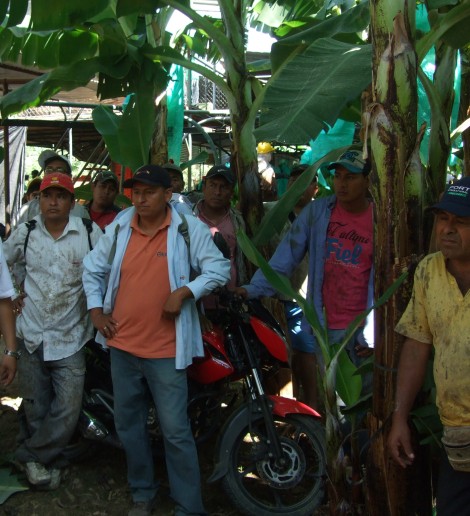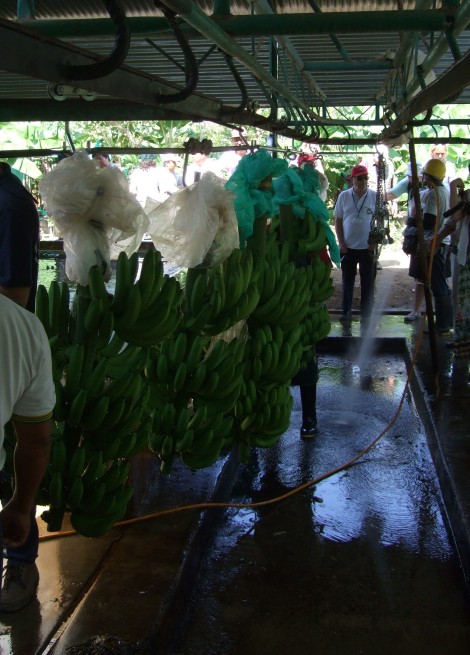Oikocredit Canada announced the wind down of its operations in Canada (November 29 | 2023). This marks the end of over 40 years of successful operations in Canada, effective Dec 31,2023. Click to read more.
Read more
Building a better banana for the world
Building a better banana for the world
In the last few years, organic bananas have been popping up in Canadian grocery stores. No longer segregated to natural food outlets, organic bananas are now featured regularly in the nation’s mainstream food chains.
How did this happen? How did this change in Canadian eating habits come about?
That story is the tale of a revolution in the banana business – a tale of transformation from large industrial production using harmful chemicals to small-scale farming rooted in natural practices and fair trade returns.
And Oikocredit has played a small but important role in this transformation.
To check out this story, on June 17, I visited APPBOSA, the Asociación de Pequeños Productores de Banano Orgánico Samán y Anexos, a fair trade and organic banana producer in the village of Saman, Peru. I visited the facility with about 25 other Oikocredit staff and volunteers as one of four Oikocredit partner tours during our week-long Annual General Meeting in Peru.

APPBOSA has a fascinating history. It dates to the 1970s land reform movement that provided properties to landless Peruvian peasants. Without training or capital, the land reform movement died, and thousands of farmers were unable to effectively make use of the land they were given.
Tough Beginnings
In Saman in 2003, about 100 of these farmers gathered to form an association. Their dream was to form a co-operative of banana producers that would export their produce around the world. In 2006, APPBOSA was established and by 2008 was ready to start exports. Then the financial crisis hit and export markets dried up. “All the export companies thought we would go bankrupt,” Aingeru Garcia, the youthful Spanish-born general manager of the co-op said to our group through a translator.
But the group persevered, and started shipping in 2009.
Shortly after, Oikocredit’s staff in Peru found out about APPBOSA and was attracted by the co-op’s fair trade and organic production. Garcia explained to Oikocredit staff that productivity was hampered by the fact that producers and labourers had to lug heavy branches of banana fruit many hundreds of metres to the packing plant, a time consuming process that led to a high level of fruit damage.
Oikocredit provided some capacity building grant funding to hire a consultant to establish a cable system allowing farmers to bring their fruit smoothly to the plant on a mechanized track. That was followed by a €150,000 loan to build the track system, and a follow on €150,000 credit line for operating capital.

Today, APPBOSA has about 420 farmers in its co-op, and employs 200 people to process, pack and ship its product to the US, Canada and Europe. Incomes of the farmers are higher, and they use part of the fair trade premium to fund a health insurance plan.
While things look bright for APPBOSA, the co-op has serious concerns about drought. Northern Peru is in a year-long drought caused by climate change which is putting pressure on aging and overtaxed irrigation systems. To adapt, the co-op will have to build new wells and update its reservoir, which could be costly. This will require new sources of capital.
APPBOSA leads the way
APPBOSA’s share of the global organic banana market is small, but it is leading the way in Peru, one of the biggest players in this market. Last year, APPBOSA was recognized by farm organizations in Peru as the leader in sustainable growth and good management. And Peru is an important supplier to the global organic banana market, representing about 20 per cent of all organic bananas in the world.
Oikocredit has strengthened and solidified this courageous group of farmers, helping them to realize their dream of exporting their product to the world. In a small way, Oikocredit has contributed to the transformation of the simple banana on two continents. In the process, it is helping to foster healthier eating and fairer economic production worldwide.

